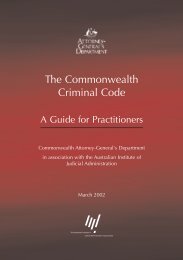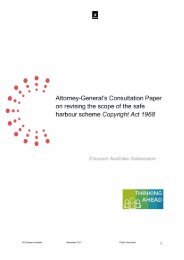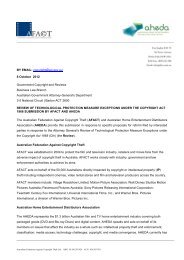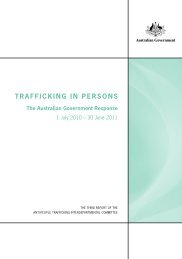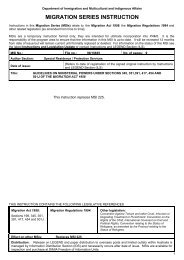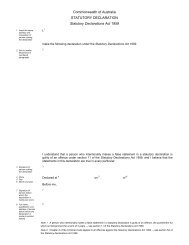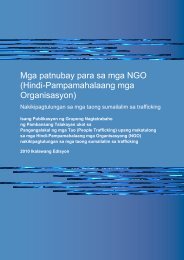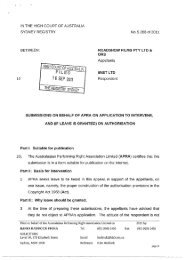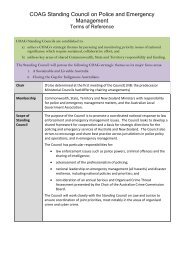Normann Witzleb [PDF 657KB] - Attorney-General's Department
Normann Witzleb [PDF 657KB] - Attorney-General's Department
Normann Witzleb [PDF 657KB] - Attorney-General's Department
Create successful ePaper yourself
Turn your PDF publications into a flip-book with our unique Google optimized e-Paper software.
interests, including the public interest in the free flow of information. There are no prima<br />
facie entitlements in this area. The ALRC acknowledges this fundamental difference<br />
between privacy and the interests protected by trespass. Rather than providing for a<br />
separate defence of consent, it considers the existence (or absence) of consent as a<br />
circumstance that affects a person’s reasonable expectation of privacy 104 and the<br />
offensiveness of the defendant’s conduct.<br />
61 Even though consent should therefore not technically be regarded as a defence, it is<br />
appropriate to expect the defendant to plead and, if necessary, to prove that the<br />
plaintiff consented. In the majority of cases, the parties agree on the factual matrix<br />
underlying the consent issue, i.e. on what the plaintiff may have said or done before the<br />
invasion occurred, but differ merely on the legal significance of this conduct, in<br />
particular whether it is sufficient to infer consent. For these cases, it will not matter<br />
whether ‘consent’ is regarded as an ‘essential element of the cause of action’ 105 or a<br />
defence.<br />
62 However, proof of the facts constituting consent (or lack thereof) will sometimes<br />
remain a live issue. In these cases, the NSW proposal is problematic because it turns<br />
the absence of consent into a threshold issue that the plaintiff needs to establish before<br />
his or her action can succeed. In Cornelius v de Taranto, 106 for example, Mrs Cornelius<br />
commissioned Dr de Taranto, a consultant forensic psychiatrist, to prepare a medicolegal<br />
report on her. The defendant prepared the report and then sent copies of it to the<br />
plaintiff’s GP and a consultant psychiatrist. The plaintiff claimed that the defendant<br />
breached her confidence by disseminating the report without her consent. The issue of<br />
whether the plaintiff had indeed given consent to the dissemination of the report was<br />
the ‘crucial question of fact’ 107 in a trial that lasted six days and then went onto<br />
appeal. 108<br />
63 Even though this case was concerned with a breach of confidence, there is no reason<br />
for the privacy action not to follow these established principles on consent. The onus<br />
would then be on a defendant who wishes to rely on consent to plead and, if necessary,<br />
prove it. Indeed, as the NSWLRC recommends that the new statutory privacy action<br />
should not affect breach of confidence and other causes of action at general law, 109 it is<br />
easily imaginable that a plaintiff in the situation of Mrs Cornelius may seek redress<br />
under both causes of action. If the onus in relation to consent differed between both<br />
causes of action and there was insufficient evidence on consent, a plaintiff would win<br />
the confidence claim but lose the privacy action. There does not appear to be any good<br />
reason for such a divergence. The more appropriate approach would be to require a<br />
defendant who seeks to rely on consent to establish the relevant facts and, following<br />
the ALRC proposal, to consider the existence of consent in the context of whether the<br />
plaintiff had a reasonable expectation of privacy.<br />
104 This is also the approach followed in the UK: Murray v Express Newspapers Plc and Big Picture (UK)<br />
[2008] 3 WLR 1360; [2008] EWCA Civ 446, at [36] (Sir Anthony Clarke MR).<br />
105 ALRC Report, at [74.159].<br />
106 Cornelius v de Taranto [2002] EMLR 6; [2001] EWCA Civ 1511.<br />
107 Cornelius v de Taranto [2002] EMLR 6; [2001] EWCA Civ 1511, at [28] (Mantell LJ).<br />
108 At trial, the claimant was awarded £3,750 to compensate her for the injury to feelings resulting from<br />
the unauthorised disclosure, and the appeal against this decision was dismissed.<br />
109 NSW Draft Bill, cl 80.<br />
22


![Normann Witzleb [PDF 657KB] - Attorney-General's Department](https://img.yumpu.com/26247895/22/500x640/normann-witzleb-pdf-657kb-attorney-generals-department.jpg)

